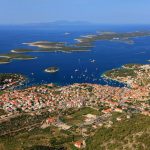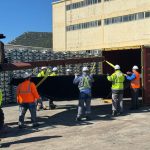ZAGREB, February 1, 2018 – The project of the future Liquefied Natural Gas (LNG) terminal on the island of Krk is being treated by the Croatian government as a strategic project at all its stages from start to end, according to a decision made by the Croatian government at its meeting on Thursday.
Economy Minister Martina Dalić recalled that on 16 July 2015, Croatia adopted a decision declaring the future LNG terminal off Krk, a strategic investment.
On 8 June 2016, the government decided to accelerate the implementation of the project and to this purpose, it opted for a two-stage implementation, the first one being the construction of a floating terminal off Omišalj on the island of Krk, and the second, ensuring an LNG terminal onshore. In the meantime, some local authorities and Green activists voiced their opposition to the construction of a floating LNG terminal.
The purpose of today’s decision is to step up preparations of all necessary activities in order to start implementing the project so that it can be in operation by the end of 2019, Dalić told the cabinet. Thus, treating both stages of the project as strategic should dispel doubts that the decision about a floating terminal in the first stage is not in compliance with the July 2015 decision.
In mid-December 2017, Croatia and the EU signed an agreement on a 101.4 million euro grant for the construction of an LNG terminal on the northern Adriatic island of Krk. The document was signed in Brussels and EU Climate Action and Energy Commissioner Miguel Arias Canete said that the agreement showed that the energy union was a reality on the ground. We are building connections which are lacking in the energy infrastructure, uniting markets and improving supply security, he added.
The funds are allocated from the Connecting Europe Facility (CEF), whose coordinating committee approved them in February. The grant will cover some of the total construction costs, estimated at 383.6 million euro.
The construction of the LNG terminal, which will first operate as an offshore floating storage and regasification unit with a yearly capacity of at least two billion cubic meters, will increase the security of gas supply in Central and South Eastern Europe. It will also improve the competitiveness in the region and, as a priority project under the Central and South Eastern Europe Energy Connectivity initiative, provide for a more effective integration of key infrastructure projects.
Until 2020, a total of 5.35 billion euro will be made available to trans-European energy infrastructure projects under the CEF.
Commenting on the future LNG terminal off the island of Krk, the European Commissioner in charge of the Energy Union, Maroš Šefčovič, on Tuesday in Zagreb said that it would be an important project not only for Croatia but also for the energy security of the whole European Union, enabling delivery of gas supplies in all directions and boosting competitiveness on the market as well a price drop.
In this context Šefčovič mentioned how the Klaipeda liquefied natural gas floating storage and regasification unit terminal in Lithuania had paved the way for a 20%-30% decline in gas prices. The Lithuanian terminal was opened in 2014.








